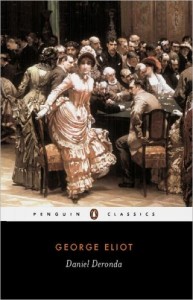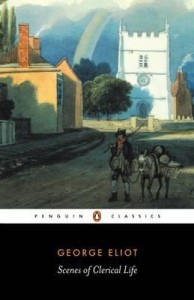Reading this novel was definitely a marathon rather than a sprint! I read it on my Kindle and the percentage was slow to grow! Plus I still have to read Mill on the Floss and Middlemarch for my Victorian book group.
Here is the plot summary from Wikipedia …
Daniel Deronda contains two main strains of plot, united by the title character. The novel begins in mid-story in late August 1865[1] with the meeting of Daniel Deronda and Gwendolen Harleth in the fictional town of Leubronn, Germany. Daniel finds himself attracted to, but wary of, the beautiful, stubborn, and selfish Gwendolen, whom he sees losing all her winnings in a game of roulette. The next day, Gwendolen receives a letter from her mother telling her that the family is financially ruined and asking her to come home. In despair at losing all her money, Gwendolen pawns a necklace and debates gambling again in order to make her fortune. In a fateful moment, however, her necklace is returned to her by a porter, and she realises that Daniel saw her pawn the necklace and redeemed it for her. From this point, the plot breaks off into two separate flashbacks, one which gives us the history of Gwendolen Harleth and one of Daniel Deronda.
In October 1864,[1] soon after the death of Gwendolen’s stepfather, Gwendolen and her family move to a new neighbourhood. It is here that she meets Henleigh Mallinger Grandcourt, a taciturn and calculating man, who proposes marriage shortly after their first meeting. At first open to his advances, she eventually flees (to the German town in which she meets Deronda) upon discovering that he has several children with his mistress, Lydia Glasher. This portion of the novel sets Gwendolen up as a haughty, selfish, yet affectionate daughter, admired for her beauty but suspected by many in society because of her satirical observations and somewhat manipulative behaviour. She is also prone to fits of terror that shake her otherwise calm and controlling exterior.
Deronda has been raised by a wealthy gentleman, Sir Hugo Mallinger. Deronda’s relationship to Sir Hugo is ambiguous and it is widely believed, even by Deronda, that he is Sir Hugo’s illegitimate son, though no one is certain. Deronda is an intelligent, light-hearted and compassionate young man who cannot quite decide what to do with his life, and this is a sore point between him and Sir Hugo, who wants him to go into politics. One day in late July 1864,[1] as he is boating on the Thames, Deronda rescues a young Jewish woman, Mirah Lapidoth, from attempting to drown herself. He takes her to the home of friends of his, and it is discovered that Mirah is a singer. She has come to London to search for her mother and brother after running away from her father, who kidnapped her when she was a child and forced her into an acting troupe. She ran away from him finally because she discovered he was planning to sell her into prostitution. Moved by her tale, Deronda undertakes to help her look for her mother (who turns out to have died years earlier) and brother and through this, he is introduced to London’s Jewish community. Mirah and Daniel grow closer and Daniel, anxious about his growing affection for her, leaves for a short time to join Sir Hugo in Leubronn, where he and Gwendolen first meet.
From here, the story picks up in “real time,” and Gwendolen returns from Germany in early September 1865[1] because her family has lost its fortune in an economic downturn. Gwendolen, having an antipathy to marriage, the only respectable way in which a woman could achieve financial security, attempts to avoid working as a governess by pursuing a career in singing or on the stage, but a prominent musician tells her she does not have the talent. In order to save herself and her family from relative poverty, she marries the wealthy Grandcourt, whom she believes she can manipulate to maintain her freedom to do what she likes, despite having promised Mrs. Glasher she would not marry him and fearing that it is a mistake.
Deronda, searching for Mirah’s family, meets a consumptive visionary named Mordecai. Mordecai passionately proclaims his wish that the Jewish people retain their national identity and one day be restored to their Promised Land. Because he is dying, he wants Daniel to become his intellectual heir and continue to pursue his dream and be an advocate for the Jewish people. In spite of being strongly drawn to Mordecai, Deronda hesitates to commit himself to a cause that seems to have no connection to his own identity. Deronda’s desire to embrace Mordecai’s vision becomes stronger when they discover Mordecai is the brother Mirah has known by the name Ezra and has been seeking. Still, Deronda is not a Jew and cannot reconcile this fact with his affection and respect for Mordecai/Ezra, which would be necessary for him to pursue a life of Jewish advocacy.
Gwendolen, meanwhile, has been emotionally crushed by her cold, self-centered, and manipulative husband. She is consumed with guilt for disinheriting Lydia Glasher’s children by marrying their father. On Gwendolen’s wedding day, Mrs. Glasher cursed her and told her she would suffer for her treachery, which only exacerbates Gwendolen’s feelings of dread and terror. During this time, Gwendolen and Deronda meet regularly, and Gwendolen pours out her troubles to him whenever they meet. During a trip to Italy, Grandcourt is knocked from his boat into the water and drowns. Gwendolen, who was present, is consumed with guilt because she had long wished he would die, although after some hesitation she jumped into the Mediterranean in a futile attempt to save him. Deronda, also in Italy to meet his Jewish mother (whose identity Sir Hugo has finally revealed), comforts Gwendolen and advises her. In love with Deronda, Gwendolen hopes for a future with him, but he urges her onto a path of righteousness in which she will help others in order to alleviate her suffering.
Deronda meets his mother and learns that she was a famous opera singer with whom Sir Hugo was once in love. She tells him that her father, a physician and strictly pious Jew, forced her to marry her cousin whom she did not love, despite her resentment of the rigid piety of her childhood. Daniel was the only child of that union, and on her husband’s death, she asked the devoted Sir Hugo to raise her son as an English gentleman, never to know that he was Jewish. Upon learning of his true origins, Deronda finally feels comfortable with his love for Mirah, and on his return to England in October 1866,[1] he tells Mirah of his love for her. Daniel commits himself to be Ezra/Mordecai’s disciple, and shortly after Deronda’s marriage, Ezra/Mordecai dies with Daniel and Mirah at his side. Before Daniel marries Mirah, he goes to Gwendolen to tell her about his origins, his decision to go to “the East” (per Ezra/Mordecai’s wish), and his betrothal to Mirah. Gwendolen is devastated by the news, but it becomes a turning point in her life, inspiring her to finally say, “I shall live.” She sends him a letter on his wedding day, telling him not to think of her with sadness but to know that she will be a better person for having known him. The newly-weds are all prepared to set off for “the East”, with Mordecai, when Mordecai dies in their arms, and the novel ends.
I have to say upfront that I really struggled through this novel – it was wordy, philosophical and religious. I think it is very much of it’s time and won’t appeal to many modern readers.
Having said that I found Gwendolyn and Mirah’s stories intriguing – their stories are reasonable similar, but their lives follow very different paths because of the choices they make. By a different author Gwendolyn would be a heroine and would live happily ever after, but Eliot doesn’t allow her the easy option she must live with the consequences of her actions and choices.
To me this novel seemed almost two in one; the English country manners tale (Gwendolyn, Grandcourt, etc) and the Jewish tale (Mordecai, the Cohens, etc). And I don’t think they mesh together well. I admire the breadth of scholarship in this novel, but couldn’t enjoy it.


